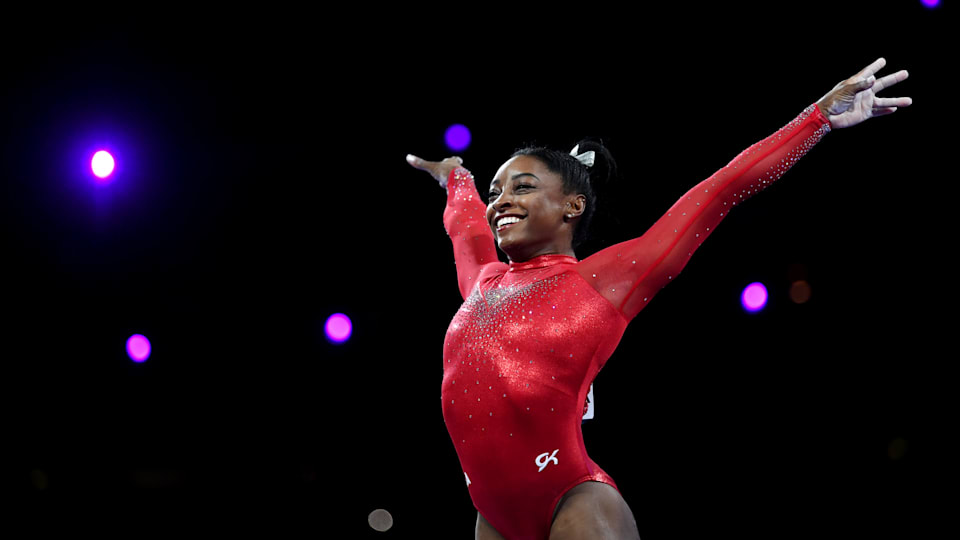
Four-time Olympic gymnastics gold medallist Simone Biles announced Thursday that she will star in a docu-series following her journey to the Tokyo 2020 Olympic Games.
The series, titled ‘Simone vs Herself’ will air on Facebook Watch, later in 2021.
“I don’t think people get the intensity of how I train and what my life looks like,” Biles said in an interview with USA Today. “I think there is a sense of normalcy they’ll get to see. But they’ll also see the rigorous training. We’re training 34, 35 hours a week to compete for 3½ to five minutes.”
The trailer highlights the difficulty and doubt Biles has faced during an extra year of training, due to Olympic postponement.
“Gymnast’s bodies are like ticking time bombs,” said Biles in the trailer. “Having to come back – am I going to be just as good? Can I do it again?”
Biles heads to Tokyo as one of the biggest names in world sports, the favourite to win up to five gold medals – like she did at the 2019 World Championships.
That feat has never been accomplished by a woman in Olympic gymnastics, though four women, including Biles, have won four in a single Games.
The incredible, flying Suni Lee
2019 World team gold medallist Sunisa Lee of the United States rocked the gymternet this week with a video of her performing a Nabieva (laidout toe-one Tkatchev) to full-twisting Pak salto combination on the uneven bars.
The combo combines an F-rated element to an E-rated element and would earn Lee 1.100 in difficulty plus a .200 bonus for connecting the skills.
On Twitter, responding to a post that read, “sunisa lee just wakes up and picks bar skills out of a hat and does them in that order,” Lee said, "basically."
Meet news… cancellation, no fans, a stacked field, oh my!
Gymnastics calendar news had it all this week: cancellations, events being held without fans, and a stacked field.
As Olympic Channel reported earlier this week, with the cancellation of the Birmingham and Stuttgart World Cup events, the International Gymnastics Federation’s All-Around World Cup series has been cancelled. The event was supposed to serve as a Tokyo 2020 Olympic qualifier.
With the cancellation, the quota spots go to the top-ranked nations based off qualifying at the 2019 World Championships in Stuttgart. That means USA, Russia, and China earned one additional spot for the women, while Russia, China, and Japan added spots on the men’s side.
The European Gymnastics Union announced this week that their championships, scheduled for Basel, Switzerland, April 21-25, will be held without spectators. The event will have added importance in 2021, as athletes will have an opportunity to qualify to the Tokyo 2020 Games in 2021.
Finally, many of gymnastics’ superstars are headed to the Doha World Cup, which begins on March 10. The field includes two-time World uneven bars champion Nina Derwael of Belgium, 2019 World horizontal bar champion Arthur Nory of Brazil, 2012 Olympic still rings champion Arthur Zanetti of Brazil, 2018 Commonwealth Games pommel horse gold medallist Rhys McClenaghan of Ireland, 2006 World all-around champion Vanessa Ferrari of Italy, 2012 Olympic high bar champion Epke Zonderland of the Netherlands, 2019 World floor exercise champion Carlos Yulo of the Philippines, 2020 European balance beam and floor exercise champion Larisa Iordache of Romania, and seven-time Olympian Oksana Chusovitina of Uzbekistan.
One notable absence from the event is double Olympic all-around champion Uchimura Kohei of Japan, who said this week he would skip the event.
From the vault...
This week, we take a look back at the legendary Soviet Union team on the floor exercise from the 1988 Olympic Games in Seoul, South Korea.
The Games marked the end of Soviet dominance in women's gymnastics, as they picked up their ninth team gold. (In 1992, after the breakup of the Soviet Union, athletes competed as the Unified Team, which also won team gold).
The artistry and technical mastery of the '88 team is unmatched, highlighted by the perfect 10.0 earned by Elena Shushunova.
